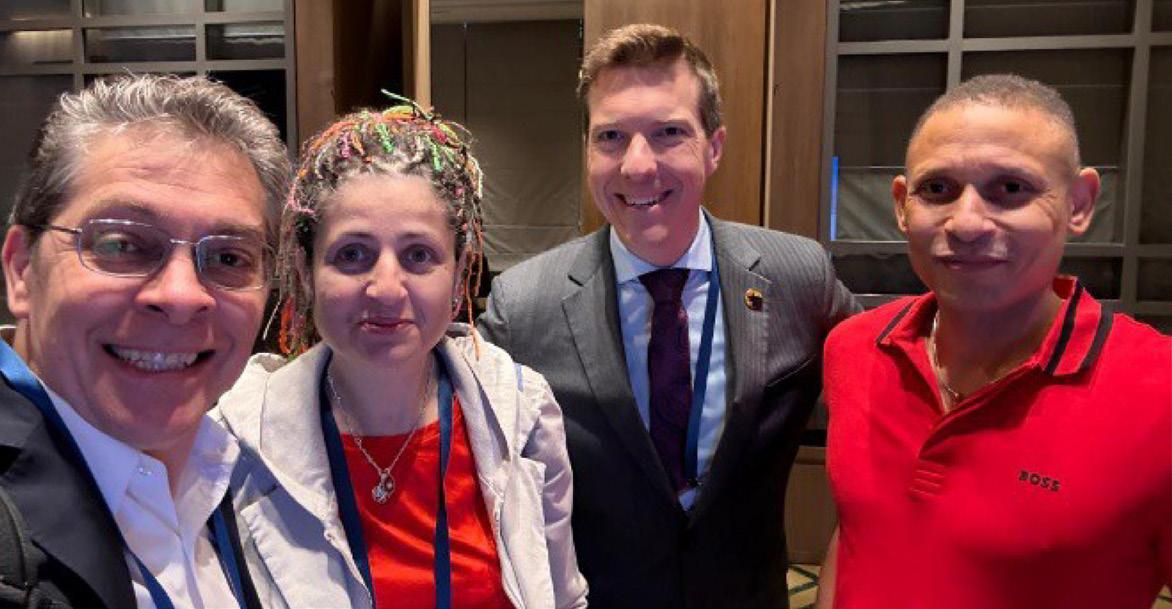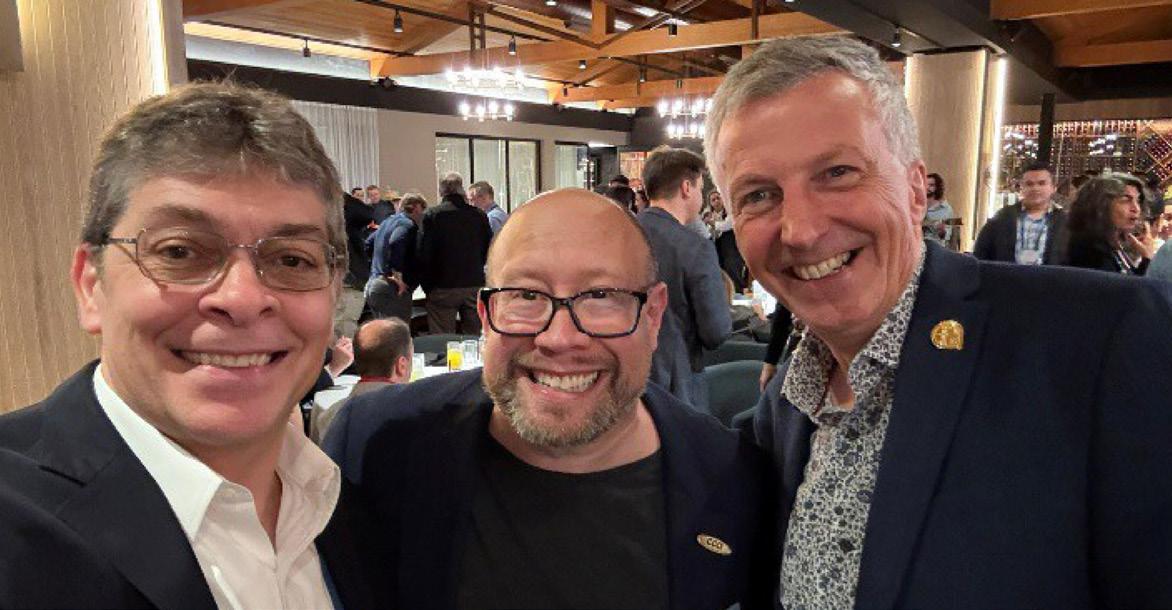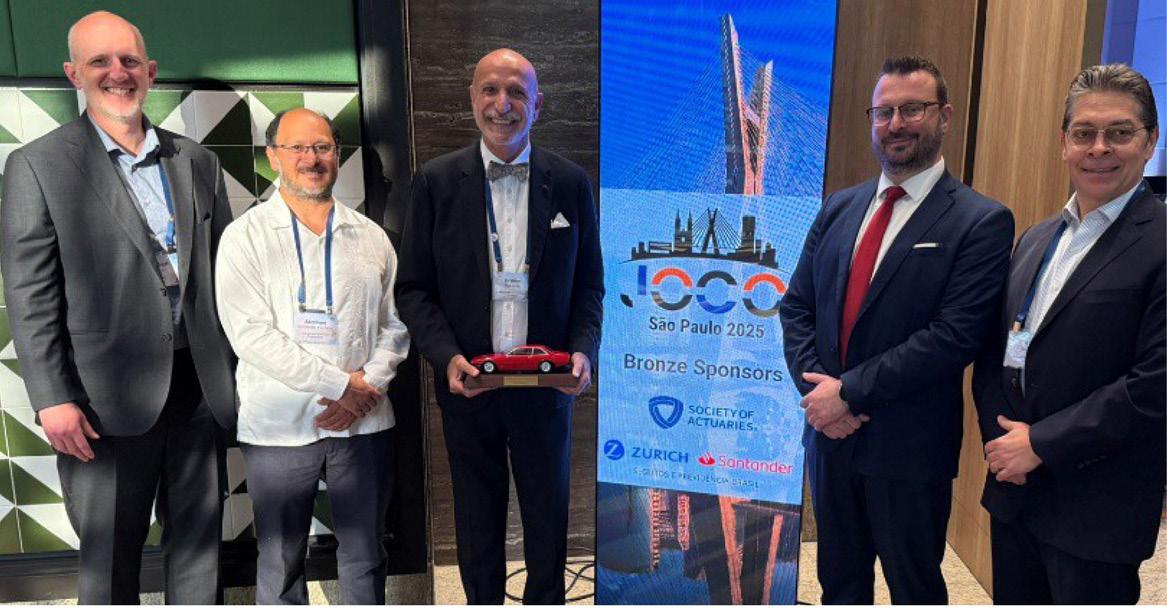são paulo, brazil
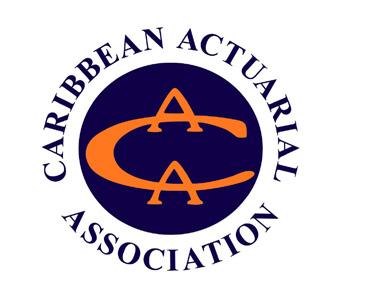
CAA Held Its Own at the IAA Meetings in São Paulo in May

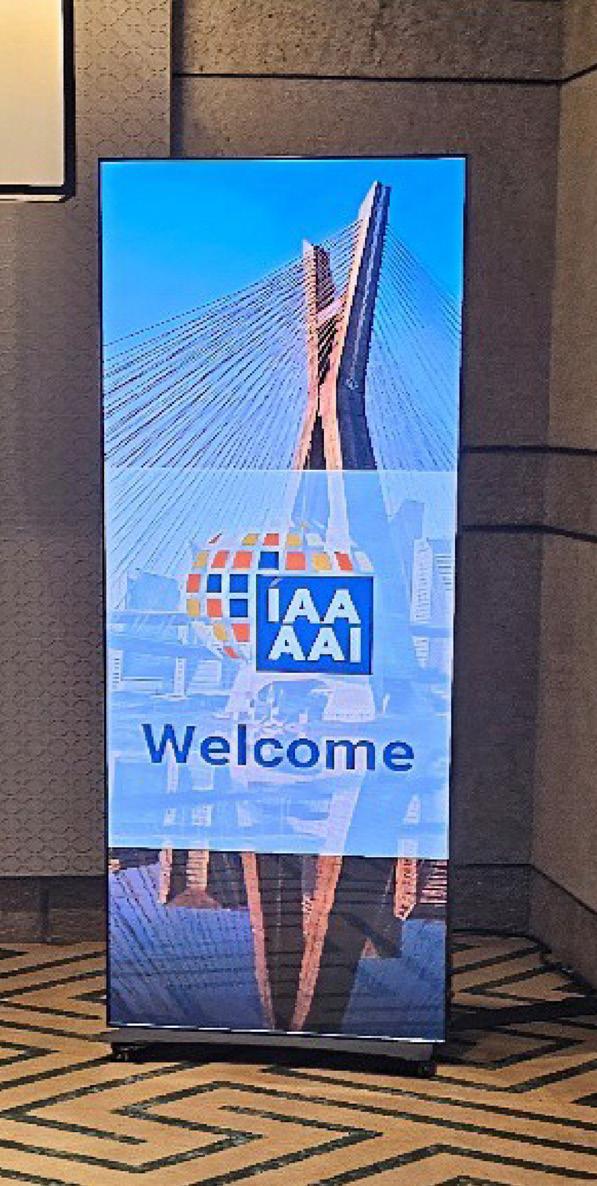
The International Actuarial Association (IAA) held its latest Joint Colloquium (JoCo) on May 18- 21, 2025, in São Paulo, Brazil.
Stokeley Smart and Kyle Rudden presented a session entitled “Application of Actuarial Techniques in Sustainability Reporting with Particular Focus on Non-Traditional Applications in Developing Markets.” They explored how actuarial tools can be used in an innovative way when applied to Environmental, Social, and Governance (ESG) considerations as well as in sustainability disclosures that go beyond traditional insurance settings. Kyle also moderated sessions on quantum computing and modelling health care in Botswana.
The IAA Council and Committee Meetings were held on May 2125, 2025, and a number of Caribbean Actuarial Association (CAA) members participated. Lisa Wade, Nicola Barrett, Kyle Rudden, Norbert Fullerton, Stokeley Smart, and Octavio Rojas attended in person, and Judy Veira, Cathy Lyn, Mike Smith, Rohan Hall, and Bertha Pilgrim attended virtually.

Representatives from over 35 countries and dozens of actuarial organizations took part, including the CAA, SOA, IFOA, CIA, and CAS, plus from a number of supranational organizations, including the Organization of Economic Cooperation and Development (OECD) and International Association of Insurance Supervisors (IAIS).
The meeting started with the Presidential Town Hall led by IAA President, Bozenna Hinton (Australian Actuarial Society). Some of the main highlights were:
Supranational Relationships highlighted how organizations and actuaries can and should be collaborating on matters of pressing importance. “Climate Science: A Summary for Actuaries,” which was prepared by the Climate Risk Task Force of the IAA and the Working Group I Technical Support Unit of the Intergovernmental Panel on Climate Change (IPCC), published in 2021, was cited as a prime example of such teamwork.
Impact through FMAs introduced representatives from Brazil, India, and Kenya, and the African Actuarial Development Academy (AADA), presented by Yeside Kazeem and Yvonne Palm.
AADA is a virtual pan-African initiative to encourage young people to pursue actuarial studies by connecting actuarial mentors and protégés. It has had some real success inspiring a new generation of actuarial students and young professionals, reaching aspirants in more than half of the countries in Africa.
Impact through Individuals featured, among others, Win-Li Toh, president of the Australian Actuarial Society, who described how her actuarial approach to understanding cyber risk somewhat surprisingly led to her being recognized as a global leader in the field, advising companies, regulators, and governments. The product of her research, a green paper entitled “Cyber Risk and the Role of Insurance,” launched her on this trajectory.
actuaries as exceptional problem solvers
A general inspirational note was sounded that we actuaries have the training, skills, and tools to tackle and solve all sorts of complex problems within companies and in the world at large. Speakers encouraged colleagues to offer their problem-solving skills in areas that might seem outside their bailiwick. They stressed the fact that the scientific, data-driven methods of actuaries are perfectly suited to bridging the work of people in a variety of generally isolated, specialized areas of technical expertise.
a panoply of important topics discussed
Among the important subjects considered in the Council and Committee meetings were environmental sustainability, new international actuarial standards, capital standards, coverage gaps, professional education, and aspects of IAA organizational governance.
Topics on every major actuarial discipline and insurance segment were discussed, including healthcare, general insurance, life, retirement savings, pension plans, and social security schemes, as well as such emerging disciplines as cyber security, AI, carbon markets, water risk, and climate change.

climate & sustainability committee
Rohan Hall and Bertha Pilgrim attended the Climate & Sustainability Committee where the workplan structure and goals were reviewed. Discussion on External Relationships focused on prioritizing relationships, (e.g., formal vs. monitoring), and on volunteer assignments to manage and act as liaisons with selected organizations.
Many viable project ideas for 2025–2026 were proposed:
Water Risk Task Force1: continue Statement of Intent work and seek volunteers. Targeted communications: develop “Climate and Sustainability Briefs.” Educational collaboration: partner with supranationals for webinars/publications. Carbon markets: support actuaries engaging in this emerging area.
Financial reporting: focus on IFRS/ISSB standards, IAN2 200, ISAPs3. Scenario analysis: tackle tail risks, stress testing, and climate modeling. Energy markets: share actuarial applications in the field of renewable energy.
Emerging economies: support FMAs via education, microfinance, and Sustainable Development Goals.
Catastrophe modeling: improve guidance to reflect climate science. Macroeconomics and transition risk: analyze decarbonization impacts. New metrics: help FMAs develop and understand new ESG indicators. Life & Heath: study the effects of climate on morbidity and mortality. Insurance affordability: explore solutions to overcome protection gaps. Climate data protection: consider advocacye for data access and security. Systematic risk: encourage holistic, interconnected risk analysis.
Temporary working groups will be formed to prioritize projects and propose workplans.
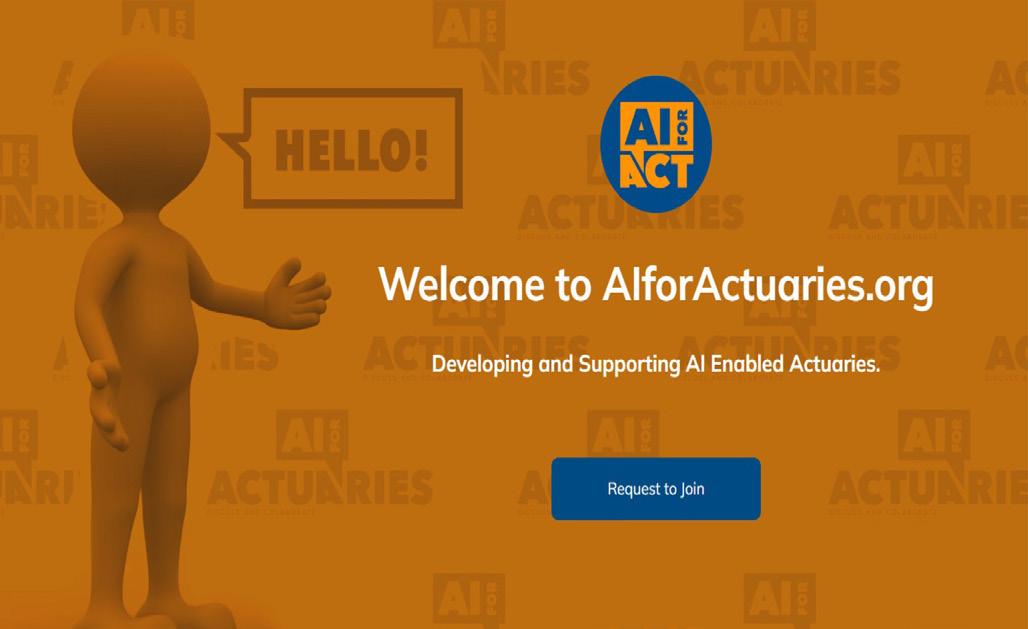
advance committee
The Advance Committee featured breakout groups, including a group focused on AI, attended by Nicola Barrett, and one on Risk Management, attended by Norbert Fullerton.
The AI breakout group discussed prioritizing how forums can use the work of the AI Task Force (AITF).
For example, we could use the case repository on GitHub, which has been available since Oct 2024. The group discussed how to make AITF work products and JoCo presentations widely available. And we considered how past recorded webinars (e.g., those posted on YouTube) can be shared with people in different hemispheres. Anyone interested is encouraged to check out the free resources available at AIforActuaries.org.
1 The Water Risk Task Force issued a study on water risk in April 2025, entitled “Sink or Swim: An Actuary’s Primer to Water Risks.” 2

The Risk Management breakout group discussed priorities for the Pensions, Benefits and Social Security (PBSS) Forum and the Enterprise and Financial Risk Forum (EFRF). Other risk discussed included future pandemics, healthcare supply capacity, liability-driven risk, inflation, liquidity- conditional funding, and cybersecurity. To keep momentum going, it was suggested that breakout groups confer more frequently than once a year.
actuarial standards committee
Ms. Barrett and Ms. Wade attended the meeting on actuarial standards, where the committee brought attendees up-to-date on several initiatives.
• ISAP 8 on IFRS S2 Climate Related Disclosures – the Committee is reviewing comments on the current exposure draft. A seminar on the topic is planned for later this year.
• ISAP 1 General Actuarial Practice – this ISAP was last updated in 2012 and a seminar on the topic is also slated for later this year (this revision may also require an analogous update to the CAA’s APS0 General Actuarial Practice).
• Five-year review of other ISAPs
• ISAP 2 — Financial Analysis of Social Security Programs (2024) - review scheduled for after ISAP 1 update if completed.
• ISAP 4 IFRS 17 Insurance Contracts (2024) – deferred until approx. 2027 when IFRS regulation updates are expected.
• ISAP 3 IAS 19 Employee Benefits – review scheduled for 2025.
diversity and inclusion task force and professionalism committee Lisa Wade led the Diversity and Inclusion Task Force meeting and the Professionalism Committee meeting, for which she is Chair and Vice-Chair respectively. As an initiative of the former, the Young Actuaries World Cup competition is currently underway. The latter addressed ethical challenges faced by actuaries in evolving practice areas, and IAN 300 which was exposed for comments earlier this year.
insurance regulation committee
Nicola Barrett attended the IRC, where Nicholas Dexter, IRC Chair gave updates on Supranationals:
• The Organization of Economic Cooperation and Development (OECD) and World Bank
• The IAIS is holding its Global Seminar on July 8-10, 2025.
• The Sustainable Insurance Forum (SIF) is sponsored by the IAIS, and by extension,
• The Nature Insurance Nexus and its Nature – Insurance Nexus Survey Results.
In addition, IRC Vice-Chair, Norma Rosas Rodgriguez gave updates on the Access to Insurance Initiative (A2ii) which has a partnership with the IAIS, and which is currently soliciting assistance with translations and funding.
A number of regulatory updates were presented, especially intended for FMAs:

There was a sweeping discussion of the IAIS’s adoption of the new Insurance Capital Standard (ICS) at its annual general meeting in December 2024. The question posed to FMAs was how are you implementing the standard in your jurisdictions, including the use of standard formulae and the application of the standard to non-Internationally Active Insurance Groups (IAIGs)?
• In the U.S., the IAIS has agreed to the country’s implementation but has issues with the U.S.’s Risk- Based Capital (RBC) interest-rate risk standard as well as its trigger point for insurance regulator intervention.
• Canada observed that it only has four international insurance groups—three life and one property & casualty.
• In the U.K., regulators have made the transition from Solvency 2 to Solvency U.K. and apparently have no appetite for further changes.
• The regulation of climate-related risk in the insurance industry4 was discussed:
• The South Africa FMA said various working groups are assessing the situation and that in general they are following international best practices.
• Nicola Barrett mentioned the CAA Climate & Sustainability Committee (chaired by Rohan Hall), as well as our collaboration with SOA/CAS on climate-risk tools, and our intent to work with our members and regulators in various countries.
• The IRC chair suggested that the FMAs might play a role in educating regulators.
Rade Musulin, chair of the Climate & Sustainability Committee, addressed the treatment of carbon markets and carbon offsets—an emerging market for actuaries—in the absence of corresponding supranational guidance. For carbon offsets to be accepted, he said, they will need insurance guarantees with the possibility of paying for losses in another carbon project rather than in money. They also would have to have no reversal or permanence.
Fernanda Chaves presented an in-depth look at Insurance Solvency Capital in the host-country of Brazil, including IFRS, AI, cyber, sustainability, as well as an overview of Brazil’s regulatory agencies for life, reinsurance, health, pension, and non-life.
membership and assistance committee
Nicola Barrett attended the inaugural meeting of the MAC, which is a merger of two former committees – Membership and Advice & Assistance. Discussion surrounded:
• How the merged committee will operate.
• Current initiatives of the MAC.
• Membership applications, members’ documents (e.g., governance)
• Engagement with current Associate Member Associations (AMAs) to offer advice and assistance in at least three areas of development as they work towards becoming FMAs.

insurance accounting committee
Kyle Rudden attended the IAC meeting, where topics included a review of IFRS 17 needs around the world; assisting smaller/less developed FMAs with implementation issues, including putting into practice something like a pared-down version of International Actuarial Note (IAN) 100 and how to adjust IFRS 17 outputs for management accounting.
The IAC is being downgraded to a lower tier and for the foreseeable future will only meet once a year at the IAA large meetings. Meanwhile, the Climate & Sustainability Committee is taking over Sustainability Reporting, in liaison with the IAC, as necessary.
education committee
Stokeley Smart attended the committee meeting and reviewed in detail the relevant documentation concerning the upcoming education-related motion scheduled for vote at the IAA Council. The proposal aligned with ongoing global efforts to elevate the quality and consistency of actuarial education. His formal recommendation to the CAA was to vote in favor of the motion, which was ultimately passed. He also volunteered to be on the Education Committee subcommittee to provide guidance on actuarial education-related matters to new and potentially new members.
strategic planning committee
Mike Smith attended the Strategic Planning Committee (SPC) meeting virtually and made the following observations.
• There are currently at least five CAA members who are Section members.
• More CAA members are likely to join if all Sections were free, like the Society of Actuaries (SOA).
• Although the SPC may not have yet realized its full potential, the CAA should continue to pursue, via the annual lottery, a Member (vs. the current Observer) seat on this Committee.
enterprise & financial risk forum
Norbert Fullerton reported on the Enterprise & Financial Risk Forum (EFRM), which included a presentation on the Japanese insurance industry’s experience with Own Risk and Solvency Assessment (ORSA). ORSA is a supervisory tool and a means to strengthen insurers’ internal governance and risk culture. The Financial Services Agency of Japan rates insurers on Enterprise Risk Management (ERM) across five levels with level 5 denoting very robust ERM and level 1 denoting serious deficiencies.
Japanese insurers have implemented ORSA in response to regulatory guidance. Their experience suggests it’s important to secure management commitment, engage with regulators, cultivate a robust risk culture, make ORSA strategic, and finally, to start small and evolve.
The Forum also included a presentation on Global Chartered Enterprise Risk Actuary (CERA) qualifications, which were initiated sixteen years ago. Today there are over 7,100 holders of the CERA designation globally. There are twenty-five FMAs authorized to offer the credential as Award Signatories. The consensus is that CERA offers solid ERM credentials as it focuses on risks very different from traditional actuarial fields and is a well-recognized qualification.

general insurance forum
Kyle Rudden attended the forum, where topics included a presentation on AI as well as on GitHub.com/IAA-AITF, which has a plethora of resources for actuaries.
Several countries gave presentations on General Insurance (Property & Casualty) developments in their markets, including host-country Brazil, the U.S., Canada, and South Africa. One common theme was how “secondary” perils such as flood and wildfire are actually causing more damage than traditional “primary” perils such as hurricanes and earthquakes. The impact of natural disasters has been rising significantly in the past few years, and actuarial modelling techniques are being adjusted to keep up.
Mike Smith suggests that CAA promote itself from Observer to Member of the GI Forum.
audit & finance committee
Among the topics discussed were risk register, financial controls, financial policies, investment performance, reserve ratio analysis, and RFPs for new auditors.
council meeting
Each Committee meeting was summarized during the Council Meeting. In addition, the Nominations Committee’s recommendation to add Nicola Barrett as a mid-term replacement on the Nominations Committee was ratified.
spotlight on kenya
Mukami Njeru (Kenya) and Lorraine Njue, president of The Actuarial Society of Kenya (TASK), gave a presentation during the Presidential Town Hall on the state of the actuarial profession in Kenya, where the entire country of 50 million people has only 120 actuaries. Nonetheless, they represent the lion’s share of the continent’s actuaries outside of South Africa. Kenya is slated to host the 34th Congress of Actuaries in Nairobi in 2029 (ICA 2029). The gathering will explore global challenges from an African perspective, including Climate Resilience, Demographic Shifts, Digital Disruption, and Financial Inclusion.
caa bids to host an iaa large meeting!
Think back to the CAA Conference in The Bahamas on Nov 14-18, 2012. The CAA hosted the IAA Council and Committee meetings that year, putting on the gala dinner on the ultimate night. We plan to repeat that feat, aiming for the Nov 2030 large meeting, and according to our five-year conference location cycle, the lucky island is…JAMAICA! More to come on this exciting topic.
call to action: join a committee / task force
The CAA encourages interested members to get involved with the IAA – see Actuaries and the IAA. A variety of committees and task forces meet mostly virtually to tackle topics of great interest to actuaries, the insurance industry and beyond. Thank you to all our current CAA representatives who are long-tenured and who have worked diligently to build and develop the CAA’s noteworthy profile within the IAA.

Simone Brathwaite | Cathy Lyn | Kyle Rudden
Michelle Chong Tai-Bell | Marlon Marquis | Stokeley Smart
Dane Doctor | Pedro Medford | Mike Smith
Norbert Fullerton | Derek Osborne | Stuart South
Rohan Hall | Bertha Pilgrim | Lisa Wade
Constance Hall | Octavio Rojas | Raymond Wilson
Every organization engages in succession planning, and we’re no different. To that end, the CAA is seeking volunteers for committees, task forces or forums for which there is room for Member representation:
• Data Analytics Forum
• General Insurance Forum
• Health Forum
• Inclusive Insurance Forum
• Mortality Forum
• Health
• Social Security SubGroup of the Pensions, Benefits and Social Security Forum
• Pandemics Task Force
• Water Risks Task Force
Multiple Observers can be added to the list above, and generally, to any non-statutory committee, task force or forum at any time.
call to action: join a section
While the IAA is made up of member associations like the CAA, IAA Sections offer membership to individual actuaries who want to work on specific topics, and who wish to engage and interact, network and exchange knowledge with other worldwide actuaries. This opportunity is open to all members of IAA member organizations and can be of great benefit to us as individuals and by extension, to our FMAs. Please consider joining.
upcoming council and committee meetings
The next IAA Council and Committee Meeting (small) will be held in Marrakesh, Morocco, on November 20-24, 2025. The next large meeting (in conjunction with ICA) will be held in Tokyo, Japan, on November 4-8, 2026.
For more information about CAA representation at the IAA, please contact Nicola Barrett, President- Elect.

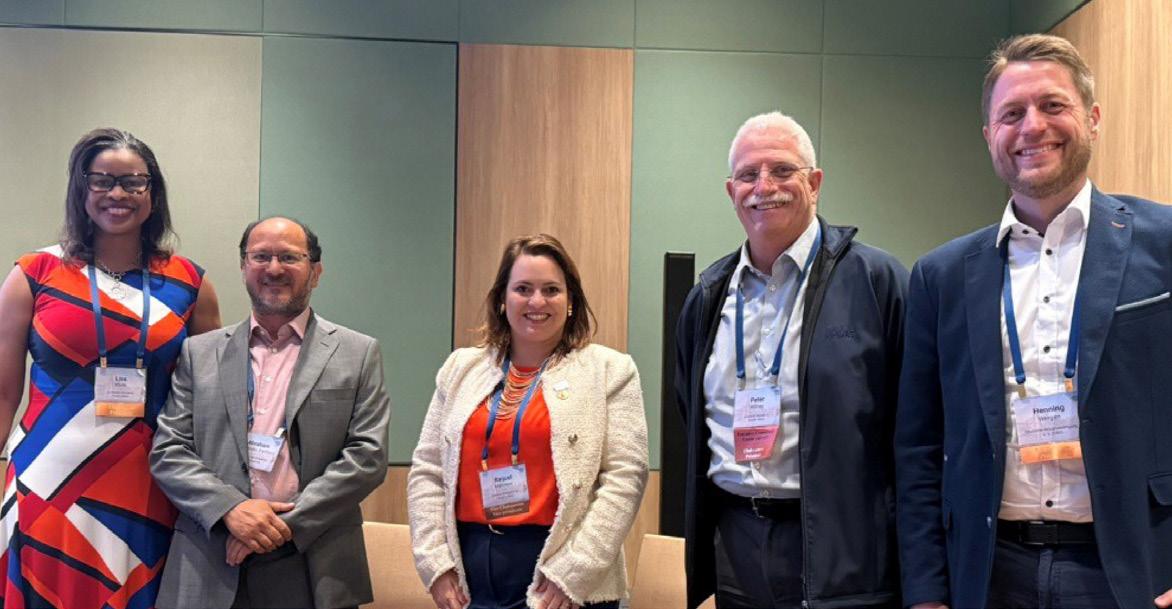
dei task force presentation, chaired by lisa wade, with abraham hernandez (portugal), raquel marimon (brazil), peter withey (south africa), henning wergen (germany – dav)


kyle rudden, esko kivisaari (finland), gunn albertsen (norway)
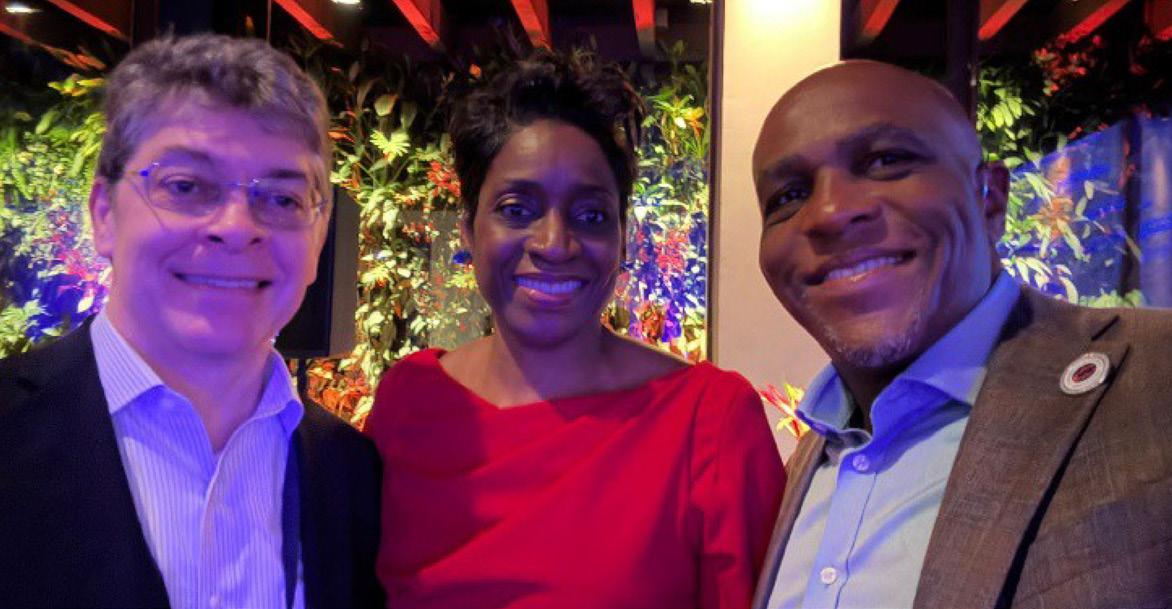
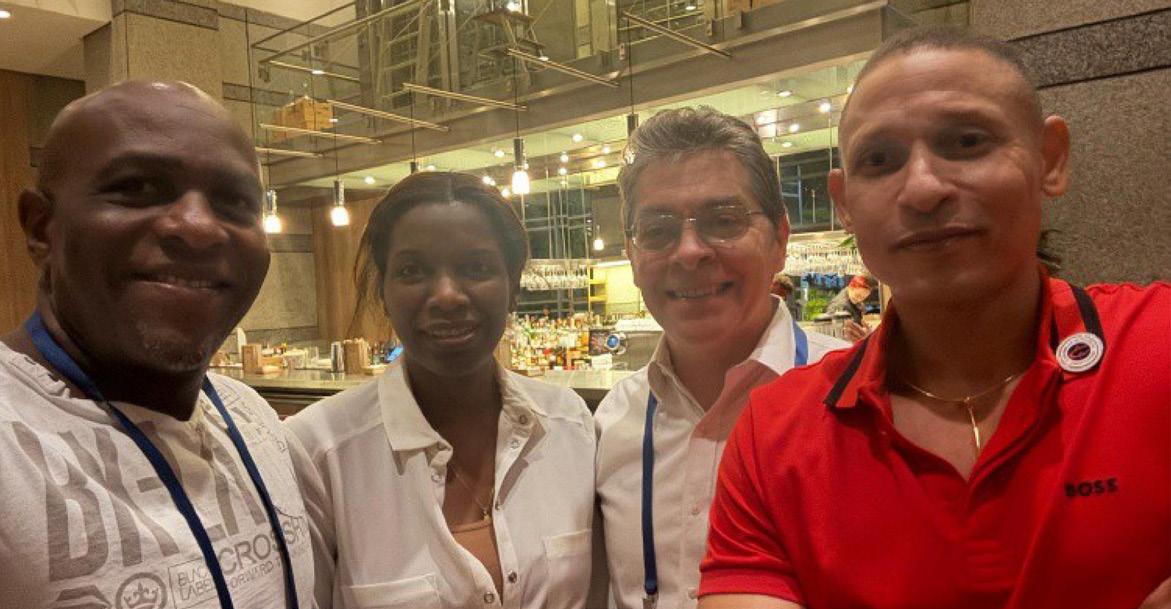

kyle rudden, bill sayre (soa), nicola barrett, norbert fullerton
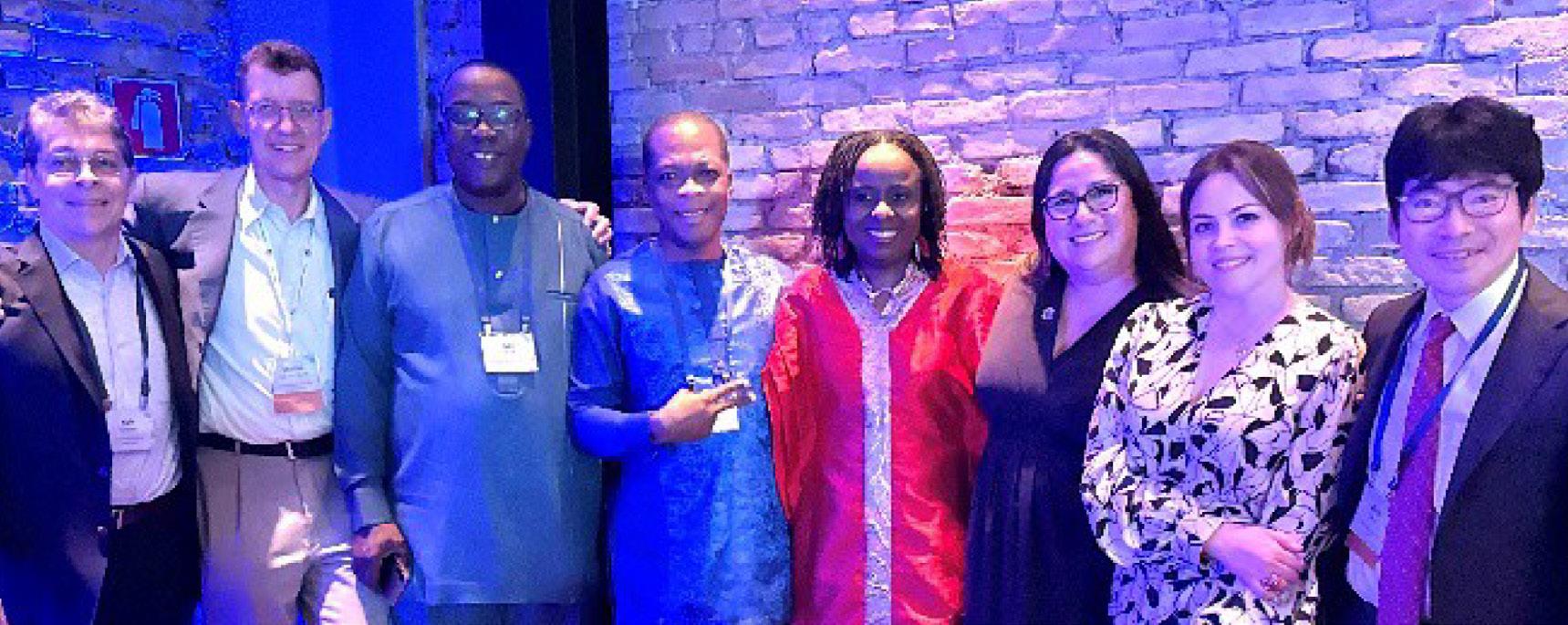
kyle rudden (caa), michiel van der wardt (netherlands), neil tagoe (ghana), joseph poku (ghana), yeside kareem (nigeria), karla zuniga-cortes (iaa) and kenji sekine (japan)

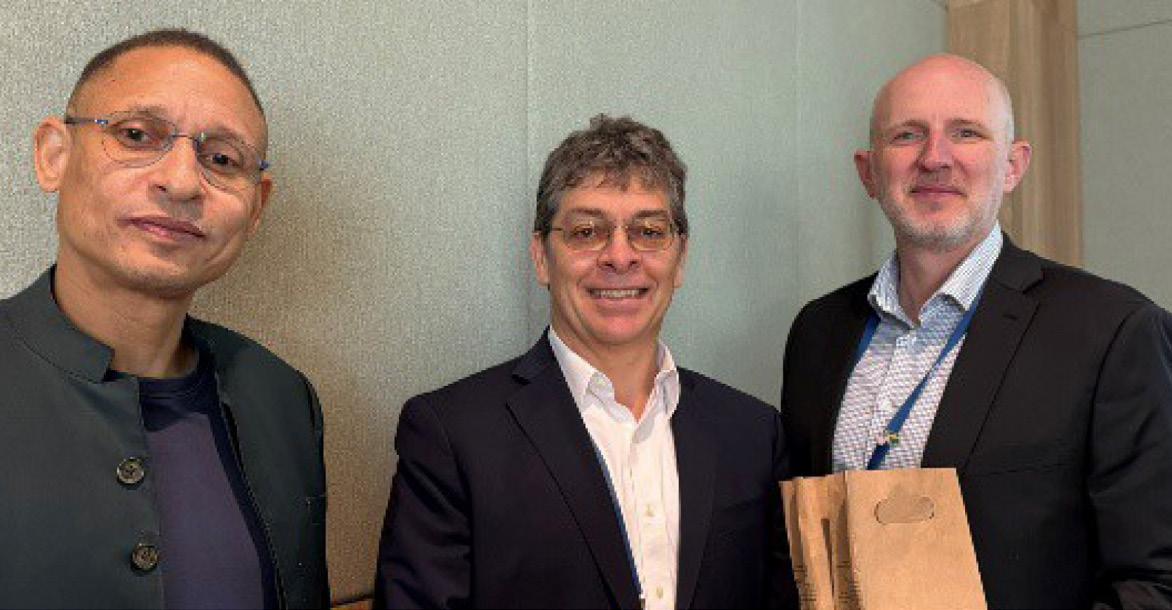
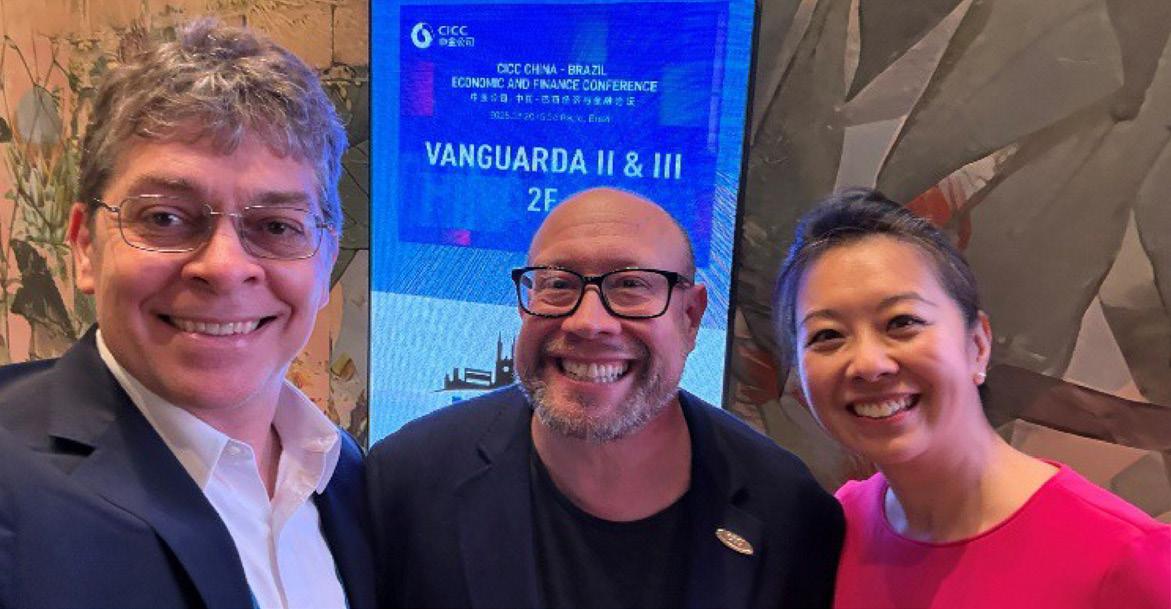
consulting actuaries)
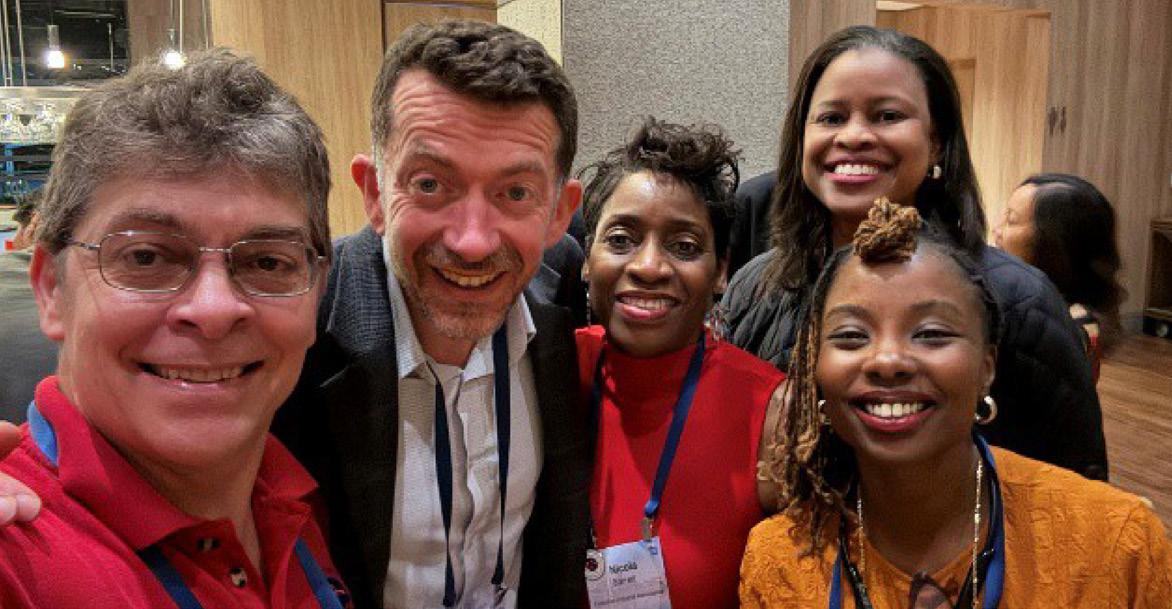
kyle rudden, malcolm kemp (ifoa), nicola barrett, lisa wade, mukami njeru (ifoa / kenya / iaca)

/ actuview),
